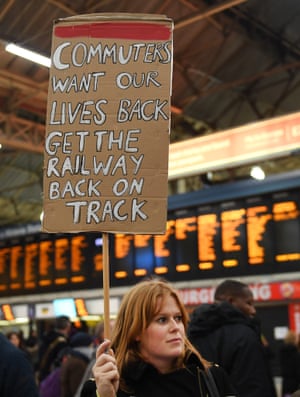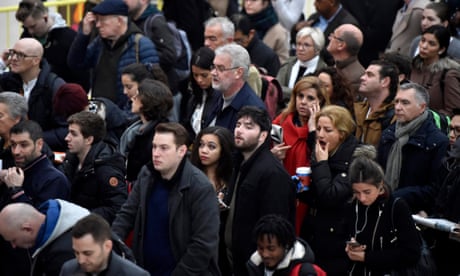Ian Allinson in The Guardian
While freedom of movement has been a hot topic since the debates around Brexit began, few would have predicted it would become such a focus in the Unite general secretary election, in which I’m standing.
Anger around jobs and conditions is justified, but often misdirected. Neoliberal capitalism has been disastrous. Free trade deals enshrine the rights of capital while ignoring the needs of humans and our warming planet. Workers have been dumped out of jobs by the million, work has intensified, workers feel more vulnerable to managerial whim, the share of wealth going to wages has fallen, welfare systems have been slashed and huge areas of life – including education, health and housing – are increasingly commoditised, all while our limited democracy is increasingly hollowed out.
Migrants are prime scapegoats for many politicians and media. Some employers provide fertile material for racists and nationalists. Fujitsu, my own employer, proposes to cut 1,800 UK jobs, hoping to boost profits by offshoring jobs to low-paid countries. Fujitsu is even asking some workers to train their replacements, brought to the UK to learn the job. Workers are being asked to dig their own graves.
When our livelihoods are threatened, workers sometimes respond by claiming privileged access to jobs, housing, and so on, and excluding others on the basis of gender, race or nationality. This is tempting because it sometimes “works” for some people for a short time. But it is misguided. If some workers try to protect their interests at the expense of others, the unity we need to win is undermined and we all lose.
Gerard Coyne is also standing for the general secretary post and his silence on this question, as on so many others, is deafening; meanwhile his relationships with the Labour right are worrying.
Len McCluskey, the present general secretary, though anti-racist, has fudged on workers’ freedom of movement, wrongly conceding ground to racists and nationalists. Just before the EU referendum McCluskey referred to it as an experiment at UK workers’ expense. As a delegate to the Unite conference shortly after the referendum, I moved a motion defending freedom of movement. Unite’s leadership opposed it, with their own motion calling for debate on the question. McCluskey now boasts that he has led this debate “demanding safeguards for workers, communities and industries affected by migration policy driven by greedy bosses”. Beyond dog-whistle politics, what does this mean?
McCluskey explained in a speech for the thinktank Class (Centre for Labour and Social Studies) that his “proposal is that any employer wishing to recruit labour abroad can only do so if they are either covered by a proper trade union agreement, or by sectoral collective bargaining”. All jobs should be covered by union agreements, but union weakness means most are not, and this applies especially to industries in which migrants have to work.
What would McCluskey’s proposal mean in practice? What would count as recruiting abroad? How long would a worker have to be in the UK before they could apply for an un-unionised job?
Giving different rights to different workers based on their nationality is discriminatory and divisive. It undermines solidarity. Blocking employers hiring on the basis of nationality would repeat the mistake of some trade unionists of a previous generation who sought to control the labour supply by excluding women from some jobs, fearing “they” would push down “our” wages. We, Unite’s membership, like the working class as a whole, come from all over the world. This is a strength, not a weakness.
It is free trade, not free movement of people, that has been a disaster for working-class people. Manufacturing has seen colossal job losses in recent decades as production has moved to countries in the south and east. Too often unions have responded by making common cause with the very employers sacking their members, against the foreign competition.
This approach has failed to protect jobs. Whether it is an employer threatening to dismiss and re-engage the same workers on lower pay (like the Durham teaching assistants), replacing workers with cheaper ones in the same workplace, or moving the jobs halfway round the world, workers are right to fight the degradation of employment. You can’t do that in partnership with the employer who is sacking you.
Thankfully workers are not always paralysed by the confusion of their leaders. Unite members at Capita and Prudential won important victories against offshoring. Members at the Fawley oil refinery spurned British Jobs For British Workers slogans and built solidarity to win equal pay for workers of all nationalities instead of trying to restrict the employment of migrants. Inspired by the Prudential win, industrial action in my own workplace currently includes refusal to cooperate with projects to move work offshore.
Unions should be following Fawley workers in demanding everyone is paid the rate for the job, regardless of employer, employment status, or nationality. We should be demanding full pay transparency, monitored by the unions. We should be calling for all jobs to be openly advertised, with no discrimination in hiring based on nationality. And existing workers should refuse to cooperate with handing over work unless their employment is assured.
The labour movement needs to regain the confidence to demand solutions that meet human needs, even when that upsets big business. We won’t do that by turning workers against each other on nationalist grounds, or by fudging the issue.
No general secretary candidate should chase votes by undermining the unity members need to defend their jobs. I am calling on Len McCluskey and Gerard Coyne to join me in championing workers’ rights to move freely (not just within the EU) and opposing any employment restrictions based on nationality.
'People will forgive you for being wrong, but they will never forgive you for being right - especially if events prove you right while proving them wrong.' Thomas Sowell
Search This Blog
Tuesday, 20 December 2016
Monday, 19 December 2016
Don’t complain about the strikers – they’re only doing what we all should in 2017
Paul Mason in The Guardian
We seem to love the working class as long as it is a) white and b) passive. The real working class is neither. It is multi-ethnic and, from Southern Rail to British Airways, it is set to strike.
Predictably, the Conservatives are calling for more legal restrictions on strike action. Theresa May accused strikers of “contempt for ordinary people”. And – as always – the neck veins of TV reporters are bulging as they express outrage on behalf of those affected.

Union leader says No 10 demonising working people in strikes row
Yet, try as they might, the politicians and journalists have failed to stir up mob hatred against the strikers, some of whom – such as the Southern Rail drivers and guards – have been taking industrial action for weeks. And the reasons for this are obvious: they are ordinary people.
While the miners and steelworkers of the 1980s worked in relatively insular steel and mining towns, everybody knows a BA cabin steward, a train guard, a baggage handler or a Post Office counter worker. What’s more, because so much of our work has become modular, low-paid and deskilled, many people know, or can guess, exactly what they are going through.
We have near full employment yet near wage stagnation. The strikes taking place over Christmas are happening among workers who have not seen a pay rise for years. BA’s onboard customer service managers, for example, have been stripped of their union negotiation rights and had their pay frozen for six years.
One of the most pitiful things about the political class, and the economists who whisper certainties in their ear, is their distance from the actual experience of work. As trade union rights have become eroded throughout the private sector, and large chunks of the public sector become privatised, a culture of coercion has taken root at work.

A commuter protests in support of Southern Rail staff. at Victoria Station in London. Photograph: Andy Rain/EPA
It does not have to be as bad as the leading fast-food cafe chain where a secret shopper deducts the bonus of an entire shift if one person does not smile. But it is pervasive.
Generally, you are supposed to smile, supposed to exhibit happiness for your seven quid an hour, obey orders without question, to hit meaningless targets or scam them on the instruction of your line manager – and, increasingly, you’re supposed to pretend you are self-employed.
You can spend entire days, if you think about it, being served only by people with no actual employment status: the Uber driver, the hairdresser, the physiotherapist. Even businesses where you’re paying a limited company through your credit card now routinely require their “associates” to be self-empolyed.
The result looks like a fake-tan version of Downtown Abbey with all the same levels of deference but zero paternal responsibility. And deep down, people who work for a living understand the modern “contract” between worker and employer is barely worth the paper it is written on.
That’s why workers with union rights and relative job security use the strike weapon. It’s never pleasant. But every cabin worker at BA and Virgin knows that, without the unions, they would see their pension rights stolen and their conditions eroded to the same levels enjoyed by their counterparts at the budget airlines.
And what’s driving the attacks is always the same familiar, financial pressure. Public services, once privatised, are forced to enter a race to the bottom in terms of pay, conditions and pensions for their workers. Once financial logic overtakes the logic of providing a service as efficiently as possible, you get the stupidities of Southern Rail, which cut its services to passengers in order to provide itself with an achievable target.
Jeremy Corbyn has been condemned for failing to condemn the strikes – and for attending a Christmas party with the Aslef union. If it were up to me, Corbyn would actually throw a Christmas party, not just for the Aslef strikers but for all the workers toiling on basic pay, fictitious contracts and unachievable targets over the festive period.
Those of us in unions – and there are still millions of us – know they make a massive and positive difference. Because workers on London Underground are unionised, there is a guard at my local tube station who refuses to wear any other name badge than one with “Lenin” on it.

No 10 accuses striking workers of 'contempt for ordinary people'
Although I do not recommend this level of resistance for everybody, it is a physical symbol of the fact that unionised workers are people you do not mess around with.
The Southern strikers, the BA crews and the Post Office workers are showing a different side of what it means to express your collective identity at work. So did the junior doctors, whose determined action got them a better deal than their leaders originally thought they could achieve.
Coming on top of the strikes by Deliveroo riders and a union-led court victory for Uber drivers, these are signs that even the heavily casualised workforce of the 21st century will not suffer indignity for ever.
In economics, it has become common to hear that one of the main failings of the current system is wage stagnation; even the Bank of England would like to see more inflation. So don’t complain about the posties, train drivers, cabin crews and baggage handlers – they’re only doing what we all should in 2017.
Ask for a pay rise, defend your pension rights, insist that work conditions are respectful and safe – and demand your employer negotiates with a real trade union and pays the rate for the job.
We seem to love the working class as long as it is a) white and b) passive. The real working class is neither. It is multi-ethnic and, from Southern Rail to British Airways, it is set to strike.
Predictably, the Conservatives are calling for more legal restrictions on strike action. Theresa May accused strikers of “contempt for ordinary people”. And – as always – the neck veins of TV reporters are bulging as they express outrage on behalf of those affected.

Union leader says No 10 demonising working people in strikes row
Yet, try as they might, the politicians and journalists have failed to stir up mob hatred against the strikers, some of whom – such as the Southern Rail drivers and guards – have been taking industrial action for weeks. And the reasons for this are obvious: they are ordinary people.
While the miners and steelworkers of the 1980s worked in relatively insular steel and mining towns, everybody knows a BA cabin steward, a train guard, a baggage handler or a Post Office counter worker. What’s more, because so much of our work has become modular, low-paid and deskilled, many people know, or can guess, exactly what they are going through.
We have near full employment yet near wage stagnation. The strikes taking place over Christmas are happening among workers who have not seen a pay rise for years. BA’s onboard customer service managers, for example, have been stripped of their union negotiation rights and had their pay frozen for six years.
One of the most pitiful things about the political class, and the economists who whisper certainties in their ear, is their distance from the actual experience of work. As trade union rights have become eroded throughout the private sector, and large chunks of the public sector become privatised, a culture of coercion has taken root at work.

A commuter protests in support of Southern Rail staff. at Victoria Station in London. Photograph: Andy Rain/EPA
It does not have to be as bad as the leading fast-food cafe chain where a secret shopper deducts the bonus of an entire shift if one person does not smile. But it is pervasive.
Generally, you are supposed to smile, supposed to exhibit happiness for your seven quid an hour, obey orders without question, to hit meaningless targets or scam them on the instruction of your line manager – and, increasingly, you’re supposed to pretend you are self-employed.
You can spend entire days, if you think about it, being served only by people with no actual employment status: the Uber driver, the hairdresser, the physiotherapist. Even businesses where you’re paying a limited company through your credit card now routinely require their “associates” to be self-empolyed.
The result looks like a fake-tan version of Downtown Abbey with all the same levels of deference but zero paternal responsibility. And deep down, people who work for a living understand the modern “contract” between worker and employer is barely worth the paper it is written on.
That’s why workers with union rights and relative job security use the strike weapon. It’s never pleasant. But every cabin worker at BA and Virgin knows that, without the unions, they would see their pension rights stolen and their conditions eroded to the same levels enjoyed by their counterparts at the budget airlines.
And what’s driving the attacks is always the same familiar, financial pressure. Public services, once privatised, are forced to enter a race to the bottom in terms of pay, conditions and pensions for their workers. Once financial logic overtakes the logic of providing a service as efficiently as possible, you get the stupidities of Southern Rail, which cut its services to passengers in order to provide itself with an achievable target.
Jeremy Corbyn has been condemned for failing to condemn the strikes – and for attending a Christmas party with the Aslef union. If it were up to me, Corbyn would actually throw a Christmas party, not just for the Aslef strikers but for all the workers toiling on basic pay, fictitious contracts and unachievable targets over the festive period.
Those of us in unions – and there are still millions of us – know they make a massive and positive difference. Because workers on London Underground are unionised, there is a guard at my local tube station who refuses to wear any other name badge than one with “Lenin” on it.

No 10 accuses striking workers of 'contempt for ordinary people'
Although I do not recommend this level of resistance for everybody, it is a physical symbol of the fact that unionised workers are people you do not mess around with.
The Southern strikers, the BA crews and the Post Office workers are showing a different side of what it means to express your collective identity at work. So did the junior doctors, whose determined action got them a better deal than their leaders originally thought they could achieve.
Coming on top of the strikes by Deliveroo riders and a union-led court victory for Uber drivers, these are signs that even the heavily casualised workforce of the 21st century will not suffer indignity for ever.
In economics, it has become common to hear that one of the main failings of the current system is wage stagnation; even the Bank of England would like to see more inflation. So don’t complain about the posties, train drivers, cabin crews and baggage handlers – they’re only doing what we all should in 2017.
Ask for a pay rise, defend your pension rights, insist that work conditions are respectful and safe – and demand your employer negotiates with a real trade union and pays the rate for the job.
Sunday, 18 December 2016
The Fourth Envelope
by Girish Menon
Paul, venerated corporate chief
Had three sealed envelopes
Which he consulted
In times of crises
Enabled his long career
And gave it to successor Neil
Neil ascends the throne
In time comes the first crisis
Opens the first envelope
‘Blame your predecessor’
The crisis abates
Neil survives
Changes the firm’s structure
Creates the second crisis
Opens the second envelope
‘Blame the culture’
The crisis is managed
Neil receives huge pay hike
Neil sacks loyal staff
Engulfs in a third crisis
Opens the third envelope
‘Prepare three such envelopes’
Neil is not ready to quit
He calls Paul for counsel
Paul says I have the mantra
That works all the time
You can have it
If you pay me the dime
Neil buys the counsel
‘Blame the economic downturn’
Neil survives the crisis
Decade in the saddle
The firm has not grown
The staff is insecure
The board has cronies
The economic downturn
Neil’s saviour in time
Will the Electoral College reject Trump on 19 December?
Erich McElroy in The Independent
On Monday 19 December, across America, the real votes will be cast that will make Donald J Trump the next president of the United States of America. That is the day that each state’s electors meet to reflect the view of the people in their state. In most US states, that means the winner takes all; in Michigan, where Trump won by only 10,700 votes, he takes all 16 electoral votes to the college.
It may sound confusing, complicated or boring, but it is actually very exciting – if your idea of super-exciting is a 226-year-old document. Talk dirty to me, Alexander Hamilton.
The President of the US is just that, the president of a bunch of states, not directly a president of the people. It is the voters representing those states, known as the electors, that make the person the president.
This year, for only the fifth time in history, the popular vote has been trumped by the electoral college because Donald won more of the smaller states. Even though Hillary Clinton has almost 3 million more votes in the national tally, it doesn’t matter.
The US is a generally successful marriage of independent states. As is often the case in a marriage, it is at its best when no one gets exactly what they want. Clearly, it is not the perfect system, but it isn’t an accident. The founders wanted the electoral college for a number of reasons. It was partly as a compromise between larger more populated states versus the smaller rural ones; back then, state identity was stronger, like it is in Europe now. In the EU, people are very clearly French first and then European. The founders also didn’t trust a direct popular vote. Partly because the founders were worried the people might be influenced by a foreign power.
There are 538 electors, awarded proportionally, meeting throughout the the US on 19 December. But they don't have to necessarily follow the way their state voted. They can, if they choose, vote with their conscience. They could decide to vote for anyone.
If they do go their own way, they are known as faithless electors. But if enough of them decide to dump Trump it could cost him the presidency.
Trump currently stands at 302 pledged votes. He can afford to lose only 36 and still be elected President. They could decide that, between Trump’s business conflicts, his failure to win the popular vote and the continuing revelations of potential interference in the popular-vote result from Moscow, they want to tell him he’s fired before he's even hired. Trump’s keeping a close eye on the vote to make sure no electors try to defect.
If Trump doesn't get the votes, the final decision gets tossed to the House of Representatives – which right now is controlled by Trump’s party. But the Representatives are old-school Republicans who would probably much rather have a more traditional president.
At that point who knows what could happen? It could be anyone. Just in case, probably best to stay by the phone.
If the electors are looking for guidance, they can always remember the words of the President-elect himself: “The electoral college is a disaster for a democracy.” If Trump does win, we might just get the disaster he warned us about.
On Monday 19 December, across America, the real votes will be cast that will make Donald J Trump the next president of the United States of America. That is the day that each state’s electors meet to reflect the view of the people in their state. In most US states, that means the winner takes all; in Michigan, where Trump won by only 10,700 votes, he takes all 16 electoral votes to the college.
It may sound confusing, complicated or boring, but it is actually very exciting – if your idea of super-exciting is a 226-year-old document. Talk dirty to me, Alexander Hamilton.
The President of the US is just that, the president of a bunch of states, not directly a president of the people. It is the voters representing those states, known as the electors, that make the person the president.
This year, for only the fifth time in history, the popular vote has been trumped by the electoral college because Donald won more of the smaller states. Even though Hillary Clinton has almost 3 million more votes in the national tally, it doesn’t matter.
The US is a generally successful marriage of independent states. As is often the case in a marriage, it is at its best when no one gets exactly what they want. Clearly, it is not the perfect system, but it isn’t an accident. The founders wanted the electoral college for a number of reasons. It was partly as a compromise between larger more populated states versus the smaller rural ones; back then, state identity was stronger, like it is in Europe now. In the EU, people are very clearly French first and then European. The founders also didn’t trust a direct popular vote. Partly because the founders were worried the people might be influenced by a foreign power.
There are 538 electors, awarded proportionally, meeting throughout the the US on 19 December. But they don't have to necessarily follow the way their state voted. They can, if they choose, vote with their conscience. They could decide to vote for anyone.
If they do go their own way, they are known as faithless electors. But if enough of them decide to dump Trump it could cost him the presidency.
Trump currently stands at 302 pledged votes. He can afford to lose only 36 and still be elected President. They could decide that, between Trump’s business conflicts, his failure to win the popular vote and the continuing revelations of potential interference in the popular-vote result from Moscow, they want to tell him he’s fired before he's even hired. Trump’s keeping a close eye on the vote to make sure no electors try to defect.
If Trump doesn't get the votes, the final decision gets tossed to the House of Representatives – which right now is controlled by Trump’s party. But the Representatives are old-school Republicans who would probably much rather have a more traditional president.
At that point who knows what could happen? It could be anyone. Just in case, probably best to stay by the phone.
If the electors are looking for guidance, they can always remember the words of the President-elect himself: “The electoral college is a disaster for a democracy.” If Trump does win, we might just get the disaster he warned us about.
Saturday, 17 December 2016
Lucky Dip
by Girish Menon
Shiv is in a bind
Got no more options
Throws the ball to the leggie
Abdul save me from my plight
What should I do skip?
Flight or darts?
The game will be lost
In a jiff or in time
Do what you please
Take a risk if you wish
Take the field that you want
Save me from my fate
I will be deposed
My record exposed
Personally divorced
Abdul, take the risk
You don't have to worry
It is my flutter
Just get me a winner
Abdul flights the ball
Six runs to win
Twelve balls to play
Three wickets left
The ball slips from his grip
Dips and hits a divot on the pitch
Shoots along the mud
Hits the batter on his foot
The ump raises his finger
The crowd is happy
The experts begin to rave
At the great bowling change
I still have some hope
My record intact
My family safe
The match is won soon after
The experts sing my praise
The cup is saved
I will remain captain again
Many wins follow
Folks call me the greatest
Skipper and tactician
That ever played
But if it was not for Abdul
And the divot on the pitch
Daily I’d be walking to Tesco
To buy a lucky dip.

Subscribe to:
Comments (Atom)
